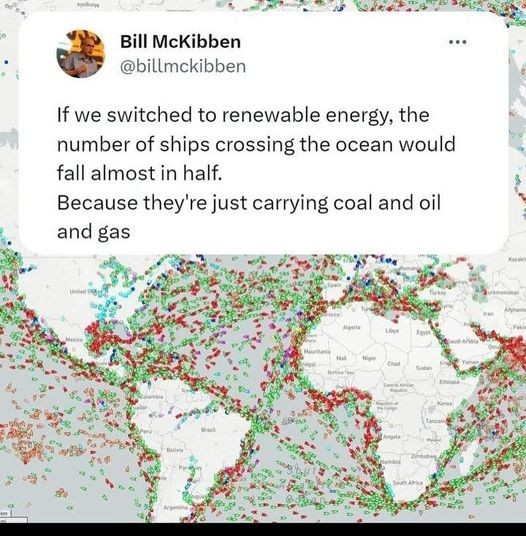Bill McKibben is based.
solarpunk memes
For when you need a laugh!
The definition of a "meme" here is intentionally pretty loose. Images, screenshots, and the like are welcome!
But, keep it lighthearted and/or within our server's ideals.
Posts and comments that are hateful, trolling, inciting, and/or overly negative will be removed at the moderators' discretion.
Please follow all slrpnk.net rules and community guidelines
Have fun!
As nice as it would be, a not insignificant amount of coal being transported is destined to steel production. Steel is iron + carbon, and the easiest source of carbon is coal. Steel is pretty important, so that's not going away anytime soon. I wonder if carbon capture could make a product that could be used to replace coal here though, and fairly effectively sequester the carbon in an actually useful form?
There are efforts to develop green steel, it'll be more expensive than coal, but coal is only so cheap because of the huge amount mined for fuel
Why wait for others?
Wind Turbine & Solar Panel Combinations: A Guide to Hybrid
Smaller and cheaper units are becoming available as individuals as well. I might try to put something like this up, one at each corner of the home and then have battery storage.
- Small Wind Generator is widely used for boats, terraces, cabins or mobile houses charging, etc; The humanized design of small wind generator is easy to install, maintain and repair
- The wind vertical turbine generator can easily adapt to various environments. Use wind energy resources to maintain a large amount of electricity. Portable vertical wind turbine generator set is suitable for emergency power generation for home, outdoor, factory and garden lighting.
Many of us have solar power. I could power all my electric usage (including driving an EV) with the solar I can fit on my roof and a modest battery
I'm impressed by recent vertical axis wind turbines, as when we have a week with little sunlight the wind is usually blowing
I live in Seattle, in the winter is why I would have to supplement.
